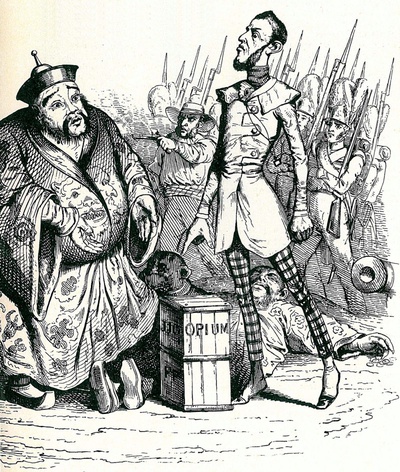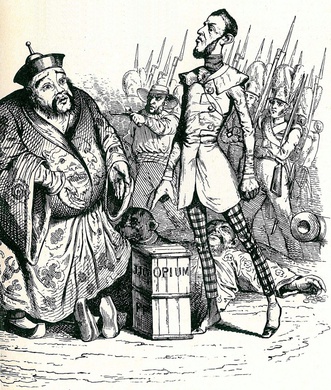
Opium becomes identified with illegal trade, criminal activity and official corruption. The imperial court and provincial officials issue a stream of edicts prohibiting importation, cultivation, sale and use of opium. They increase the harshness of penalties to include execution. They make examples of Chinese merchants, corrupt officials and users. They put pressure on foreign traders, closing access to ports and restricting their ability to live in China.
The foreign traders flood the market using off-shore locations to transfer the opium from their clipper ships to small well-armed Chinese boats called “fast crabs” or “scrambling dragons” that take the product ashore. The price of opium drops.
Smoking opium spreads from the coast, along the rivers and into the cities. Men aged 20-55 are the principle users with government workers and soldiers heavily represented. Opium is reported to be demoralizing people, sapping the energy of the army and corrupting local officials and the police.
Source: Austin, A.A. (1978). Perspectives on the History of Psychoactive Substance Use. NIDA.
| Drugs: |
Opium (morphine, heroin, opioids) |
| Regions: |
China |
| Topics: |
Cultivation, production and trade, Health and social problems, Prohibition |
Related Timeline Items
Emperor Yung Cheng prohibits the sale of opium for smoking in China (1729 CE)
An edict prohibiting the sale of opium and the operation of smoking houses is issued by Emperor Yung Cheng. The selling of opium for smoking purposes is now considered a crime. Opium merchants (but not buyers) face severe penalties including execution. The edict did not prohibit traditional medicinal use of opium.
The edict was in response to reports of the evils of opium smoking in some of the remote southern areas influenced by foreign traders and where there had been an epidemic of lawlessness. Until well into the 18th century, opium smoking is relatively localized and not taken too seriously by the imperial government.
The edict did not have much impact on the opium trade or the growing practice of smoking opium, in part, because of strong demand, a ready supply and the corruption of local officials.
A monopoly on opium cultivation in Bengal, India (1773 CE)
The British East India Company establishes a monopoly on opium cultivation in the Indian province of Bengal.
Following the collapse of the Mughal Empire, opium cultivation entered a period of disorganization until the East India Company was drawn into politics by overthrowing the Indian government in Bengal. A group of British merchants organized an informal opium monopoly in the 1760s that was replaced by an official Company monopoly in 1773.
General Warren Hastings became governor in charge of the Company’s affairs in Bengal and thereby the first governor-general of British India from 1773 to 1786. In creating the Company monopoly, his intent was to control production and limit supply. Later the Company developed a method of growing opium poppies cheaply and abundantly and the focus became expanding cultivation and maximizing profits.
Playing with prohibition in China (1780s)
In 1780, the Chinese imperial court releases another edict – this time prohibiting the consumption of opium and reiterating the earlier prohibition on selling opium.
In 1787, the directors of the British East India Company, aware of Chinese official policy, indicate their willingness to consider prohibiting the export of opium from India to China. Company officials based in China, however, argue that the Chinese are never sincere on the matter. Officials issue edicts against opium with one hand while they extend the other to accept bribes.

German cartoon illustrating hypocrisy of Britain forcing China to buy opium (1842)

